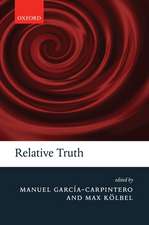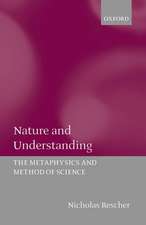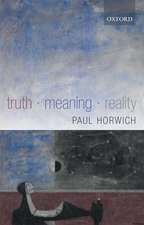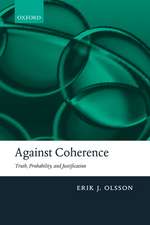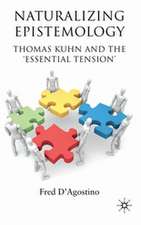Error: (On Our Predicament When Things Go Wrong )
Autor Nicholas Rescheren Limba Engleză Paperback – 30 ian 2009
In Error, Nicholas Rescher presents a fresh analysis of the occurrence, causality, and consequences of error in human thought, action, and evaluation. Rescher maintains that error-avoidance and truth-achievement are distinct but equally important factors for rational inquiry, and that error is inherent in the human cognitive process (to err is human). He defines three main categories of error: cognitive (failure to realize truths); practical (failure related to the objective of an action); and axiological (failure in evaluation), and articulates the factors that contribute to each. His discussion also provides a historical perspective on the treatment of error in Greek philosophy, and by later thinkers such as Aquinas, Descartes, Spinoza, Leibniz, James, Royce, Moore, and Russell.
Error is an important reexamination of the significance of error to the fields of philosophical anthropology, epistemology, ontology, and theology. As Rescher’s study argues, truth and error are inexorably intertwined—one cannot exist without the other. Error is an unavoidable occurrence in the cognitive process—without missteps on the path to truth, truth itself cannot be attained. The risk of error is inherent in the quest for truth.
Error is an important reexamination of the significance of error to the fields of philosophical anthropology, epistemology, ontology, and theology. As Rescher’s study argues, truth and error are inexorably intertwined—one cannot exist without the other. Error is an unavoidable occurrence in the cognitive process—without missteps on the path to truth, truth itself cannot be attained. The risk of error is inherent in the quest for truth.
Preț: 344.97 lei
Nou
Puncte Express: 517
Preț estimativ în valută:
66.03€ • 71.75$ • 55.50£
66.03€ • 71.75$ • 55.50£
Carte tipărită la comandă
Livrare economică 21 aprilie-05 mai
Preluare comenzi: 021 569.72.76
Specificații
ISBN-13: 9780822960119
ISBN-10: 0822960117
Pagini: 128
Dimensiuni: 140 x 210 x 5 mm
Greutate: 0.18 kg
Ediția:1st Edition
Editura: University of Pittsburgh Press
Colecția University of Pittsburgh Press
ISBN-10: 0822960117
Pagini: 128
Dimensiuni: 140 x 210 x 5 mm
Greutate: 0.18 kg
Ediția:1st Edition
Editura: University of Pittsburgh Press
Colecția University of Pittsburgh Press
Recenzii
“Rescher's style is very straightforward and focuses closely on the [philosophical] arguments. There is no question that this author defends theses that are both clear and metaphysically solid. Reading this book is a real pleasure.”
—Estudios Filisoficos
—Estudios Filisoficos
“This book offers an interesting new interpretation and synthesis of familiar and disparate material about error. I know of no other work like it. It will interest not just specialists, but also general readers.”
—Alan Musgrave, University of Otago
—Alan Musgrave, University of Otago
“A fascinating and challenging book. Rescher has taken a much neglected and overlooked idea and placed it at the heart of cognition.”
—Frederick Rosen, University College London
—Frederick Rosen, University College London
Notă biografică
Nicholas Rescher is Distinguished University Professor of Philosophy at the University of Pittsburgh and co-chairman of the Center for Philosophy of Science. A member of the American Academy of Arts and Sciences, he has served as president of the Eastern Division of the American Philosophical Association, the Leibniz Society of North America, the Charles S. Peirce Society, the American Catholic Philosophical Association, and the Metaphysical Society of America. Rescher is the author or editor of more than one hundred books, including Ignorance (On the Wider Implications of Deficient Knowledge), Philosophical Inquiries: An Introduction to Problems of Philosophy, and A Journey through Philosophy in 101 Anecdotes.
Descriere
A new analysis of the occurrence, causality, and consequences of error in human thought, action, and evaluation. Defines three main categories of error, and provides a historical perspective on error from Greek to modern philosophy.



